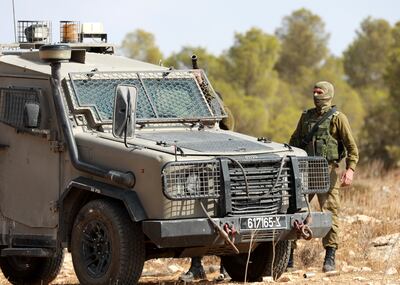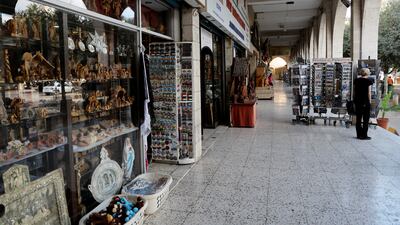In Bethlehem and its surrounding villages Palestinians have been stocking up on essential supplies amid an imminent Israeli ground invasion of the Gaza Strip.
While the Israeli military has focused much of its anger and attention towards Gaza following last weekend’s shocking attack by Hamas that left 1,300 Israelis dead, Palestinians in the West Bank fear for their countrymen in the south, but also for what may come next.
Muhammad Ghuneim, 50, who runs Al Naji Shopping and Retail in Bethlehem said his sales have skyrocketed in recent days and people race to stock up on dried goods.
“Our sales on the first day were much higher than what we usually sell on the first days of Ramadan,” Mr Ghuneim told The National, referring to the Muslim holiday that is usually the busiest period of the year.
He said many people were concerned about what might happen if Israel invades Gaza.
“If Gaza falls, we will suffer immeasurably,” Mr Ghuneim said. “The people of Gaza are in desperate need of anything that could mitigate their suffering, and average people in the West Bank can only rush to stores to buy food items, to be prepared for suffering as well.”
Having been under occupation for decades, Palestinians have become familiar with wars and military confrontations such as the one in Gaza. The looming military and political uncertainty in the region has dominated conversation in social groups this week.
In a small falafel restaurant just south of Bethlehem, three retired men discussed the “unimaginable” events in Gaza and their influence on all Palestinians. All three men who wished to only be identified by their first names, have small olive and grape fields, very close to Israeli settlements built on lands confiscated from their town.
The retired imam, teacher, and construction contractor are all concerned about restriction on movement across the West Bank which has prevented them from accessing their fields.
"My field is very close to an Israeli settlement, and if I go there, altercations with Israeli settlers or their security guards will be inevitable, said Muhammad, 61, the retired contractor.
“I choose not to go to my field because I am an irritable man, and at this age, I can never stand being humiliated or bad-mouthed by settlers or security guards, whatever the consequences,” he said.
Mr Muhammad said a young Palestinian man was shot on Friday by an Israeli settler in the area of Masafir Yatta in Hebron, in the southern West Bank, following what was described as a petty quarrel.
The imam, Khader, 63, agrees.
“The olives can wait, the grapes can’t, but our lives are much more precious than both,” he said.
He added that another farmer from the town narrowly escaped being shot when he went to pick some grapes two days ago.
Khader said security guards at an adjacent Israeli settlement arrived and kicked the man out at gunpoint.
“He begged them to take two boxes, which he had already picked, but they pointed their guns at him threatening to shoot him if he didn't leave the boxes and leave immediately,” Khader said.

Retired teacher Abdullah, 63, was reading text messages on his phone with updates from a farmer, hoping to hear something reassuring.
Year of bloodshed
At least 54 Palestinians have been killed and more than 1,100 wounded in the West Bank since October 7, according to the Palestinian Health Agency.
For some, the conflict in the south represents a rare crack in Israel’s normally impenetrable armour.
The owner of a hardware store in the Bethlehem area, described the conflict in three phases.
The first phase was Saturday’s attack. This “explosion,” the store owner, who did not want to be identified, was the outcome of decades of blockade and pressure on Gaza.
“The siege on the Gaza Strip is much longer than people say. It technically started in 1987,” he said.
Phase two, he explained, was the Israeli military attack on Gaza, whose main goal is to “create a new power to rule the Gaza strip, at any cost". Nobody can tell how long it could take, but I have reason to believe it’s going to take a while, he added.
Phase three is Palestinian victory, he said, maintaining that it depends on the Arab people who could join the battle “which is either the last against Israel, or the penultimate.”

